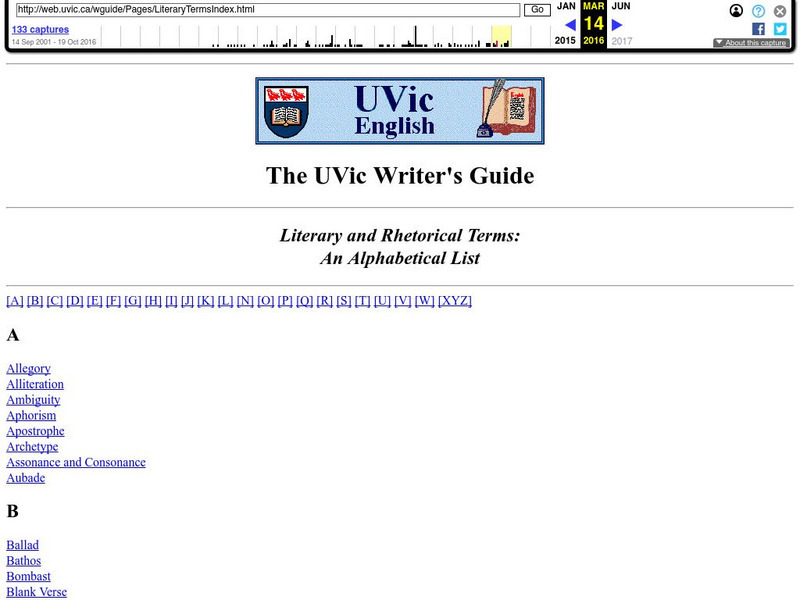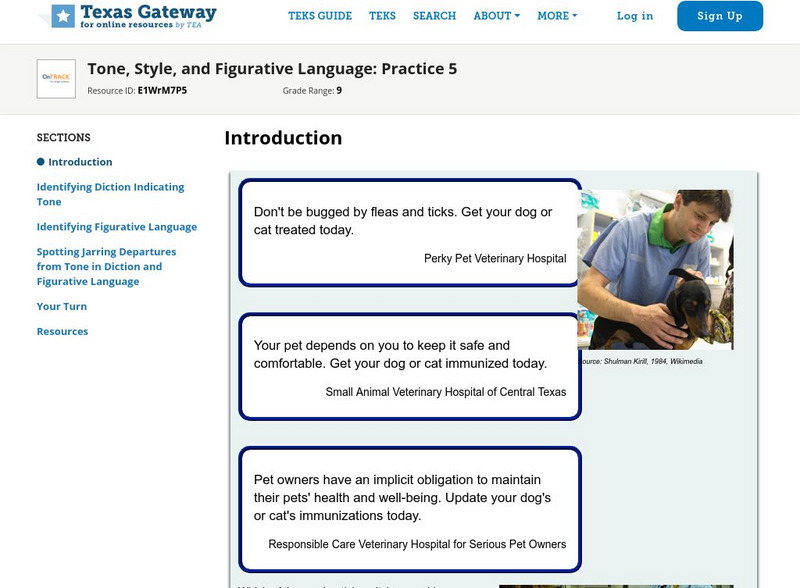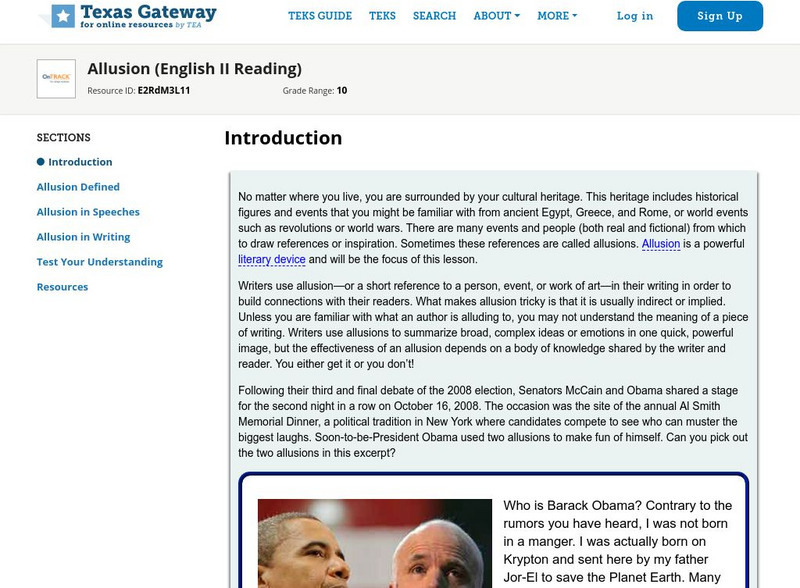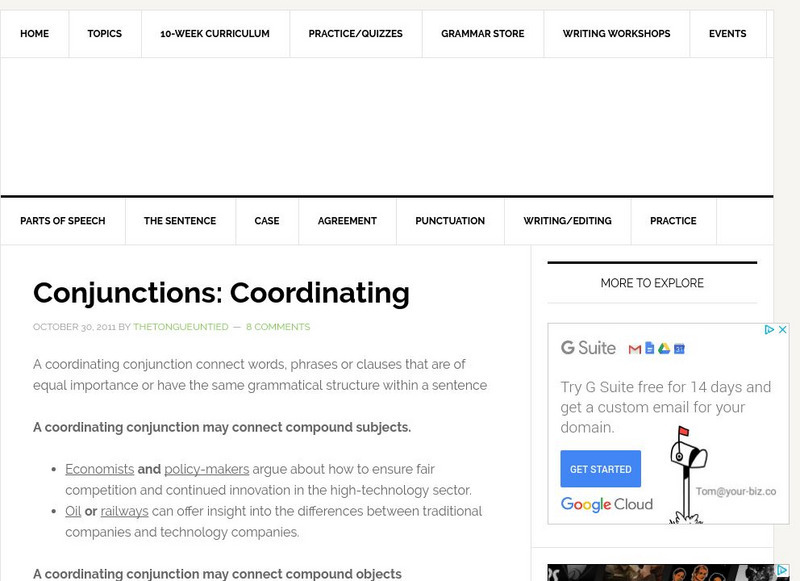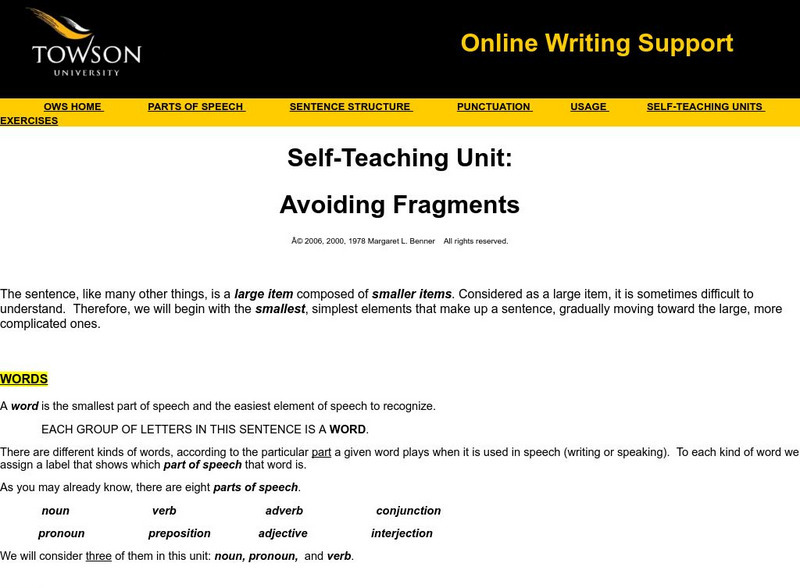Curated OER
Synecdoche vs. Metonymy: Definitions
Ask your class to lend their ears, and eyes, to a short video that defines and offers examples of synecdoche and metonymy. Whether it be brand names like Kleenex® and Band-aids® that have come to stand for all the products in a category,...
Curated OER
Cliches, Paradoxes
Clichés, paradoxes, and equivocations are detailed in a short, animated video that defines and illustrates these writing traps. The resource also includes a quiz and the transcript for the video. Users can register to access free course...
Curated OER
Similes in Literature: Definition and Examples
Be as romantic as a poetic. Appear as clever as Einstein. Wow others with your powers of observation by using similes to point out the similar aspects in two different things. This short video focuses on similes found in Shakespeare and...
Curated OER
Types of Irony: Examples & Definitions
Isn’t it ironic that many situations labeled ironic aren’t? Properly labeled examples of verbal, dramatic, and situation irony are defined and illustrated in a short, animated video that uses passages from literary works as models. The...
Curated OER
It's All in the Way You Say It
High schoolers unearth multiple meanings based on connotation and cadence. After defining denotation, connotation, and cadence, readers evaluate similar words to compare connotations. They then play with how cadence affects meaning by...
Georgia Department of Education
Ga Virtual Learning: "Top Twenty Figures of Speech" [Pdf]
This is a two-page PDF of the "Top Twenty Figures of Speech" which provides 20 literary techniques with their definitions from GrammarAbout.com.
University of Toronto (Canada)
University of Toronto Libraries: Glossary of Literary Theory
A glossary of definitions for terms related to literary theory. Click each word in the glossary list and a definition with examples appears.
Sophia Learning
Sophia: Euphemisms
This slideshow lesson focuses on euphemisms including providing definition and background, lists of common examples, practice determining meaning, information about when to use, and links to more information about them. L.9-10.5a Figures...
University of Victoria (Canada)
U Vic Writer's Guide: Literary and Rhetorical Terms: An Alphabetical List
This is an alphabetical list of literary and rhetorical terms; each includes a definition and examples.
Texas Education Agency
Texas Gateway: Tone, Style, and Figurative Language: Practice 5
Mark examples of figurative language and the diction that indicate tone.
Texas Education Agency
Texas Gateway: Allusion (English Iii Reading)
This lesson focuses on allusions including the definition, how allusions work, one- and two-word allusions, alluding to another text, and how to identify them.
Texas Education Agency
Texas Gateway: Simile and Metaphor (English Iii Reading)
You will be able to identify the similes and metaphors in a text and evaluate their importance to the meaning of the text. W.11-12.2d Lang/Fig/Voc
Texas Education Agency
Texas Gateway: Analyze Use of Stylistic a Rhetorical Details
[Accessible by TX Educators. Free Registration/Login Required] In this lesson, you are going to learn to comment on writing composed by writers who are aesthetic types, writers who use language to bring images to our minds as we read....
Texas Education Agency
Texas Gateway: Literary Terminology: Practice 5 (English I Reading)
[Accessible by TX Educators. Free Registration/Login Required] To be "in the know" in literature, you need to know the terminology used to describe, interpret, and analyze poetry, drama, and fiction. As you proceed through the sections...
Rutgers University
Rutgers University: Glossary of Literary and Rhetorical Terms: Modernism
A succinct definition of modernism, with examples of authors and styles.
Texas Education Agency
Texas Gateway: Understanding and Analysis of Literary Text: Allusion
A learning module that teaches students about allusion as a literary device in five mini-lessons: Introduction, Allusion Defined, Allusion in Speeches, Allusion in Writing, Test Your Understanding.
Texas Education Agency
Texas Gateway: Understanding and Analysis of Literary Text: Syntax
A learning module that teaches students about syntax in six mini-lessons: Introduction, What is Syntax?, The Building Blocks of Syntax-Clauses and Phrases, Adding on-Figures of Speech, and Your Turn.
Texas Education Agency
Texas Gateway: Understatement/overstatement (English I Reading)
A learning module that teaches students to recognize hyperbole and understatement as literary devices in five modules: Introduction, Recognizing Hyperbole and Understanding Its Purpose, Identifying Hyperbole in Poetry, Recognizing...
The Tongue Untied
The Tongue Untied: Conjunctions
Maintained by the University of Oregon School of Journalism and Communications, this site offers a good definition and numerous examples of coordinating conjunctions. Also has hyperlinks to sections on subordinating conjunctions,...
University of Illinois
University of Illinois: The Grammar Handbook: Interjections
A resourceful and professional look at interjections. Provides definitions, examples, and additional information. A great site from the Writing Center at the University of Illinois.
Towson University
Towson University:online Writing Support: Self Teaching Unit: Avoiding Fragments
This module focuses on what makes a sentence including parts of speech, subjects and predicates, and phrases and clauses. It then explains fragments and how to avoid them. It offers links to several exercises and a post-quiz.
Ted Nellen
Cyber English (By Ted Nellen): Allegory
This is a glossary entry for the term "Allegory" including multiple definitions for the term, links to other figures of speech, links to more information, and examples.
Ted Nellen
Cyber English (By Ted Nellen): Allusion
This is a glossary entry for the term "Allusion" including a defintion, an example, and links to more information.
Ted Nellen
Cyber English (By Ted Nellen): Apostrophe
This is a glossary entry for the term "Apostrophe" including a definition, examples, and a discussion of the differences between "apostrophe" and an "authorial instrusion."




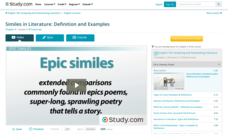


![Ga Virtual Learning: "Top Twenty Figures of Speech" [Pdf] Unit Plan Ga Virtual Learning: "Top Twenty Figures of Speech" [Pdf] Unit Plan](https://d15y2dacu3jp90.cloudfront.net/images/attachment_defaults/resource/large/FPO-knovation.png)

